Sustainable sewing in a solar-powered campervan
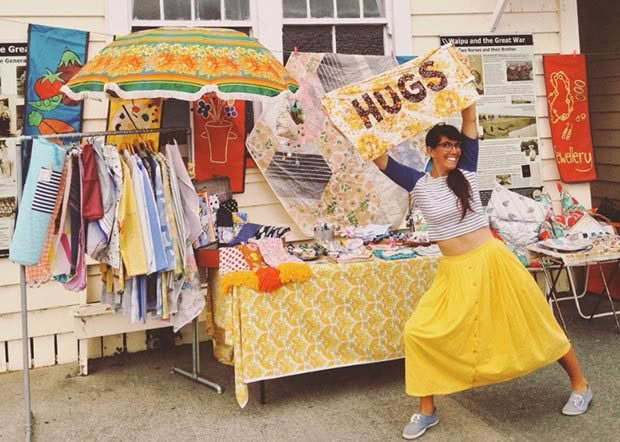
Sarah Lancaster is a maker on a mission to encourage sustainability – one hand-made tote at a time. Through her business, Sew Love, she’s teaching basic tailoring skills such as hemming, mending and patchwork.
Words: Lisa Scott
Thirty-year-old Sarah Lancaster has spent the last five years spreading the word about upcycling and conscious consumerism and, during the past two summers, from within a solar-powered 1984 Mitsubishi campervan called Cecil while on a road trip around New Zealand.
Cecil is Sarah’s hub-capped mending hub and the headquarters of Sew Love in which she teaches basic sewing skills to pupils yearning to patch, stitch and repair their clothes.
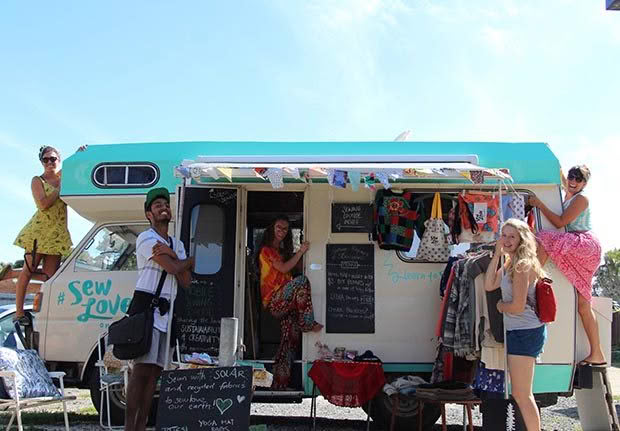
Cecil the solar-powered campervan.
Sarah inherited her love of sewing from her mum who made many of the family’s clothes. Her mother’s pattern collection is the dressmaking equivalent of pencil marks on a door jamb.
After Sarah attended small-business night classes (through Te Wanaga O Aotearoa in 2013) and, the following year, attending a course at industry training establishment NZ Fashion Tech in Auckland, Sarah started what is believed to be New Zealand’s first sewing lounge. Sew Love, in St Kevins Arcade in Auckland, attracted people who wanted to learn to sew from a pattern or, perhaps, mend a favourite pair of jeans. Everyone was welcome and, often over tea and cake from a neighbouring cafe, enjoyed learning various sewing skills.
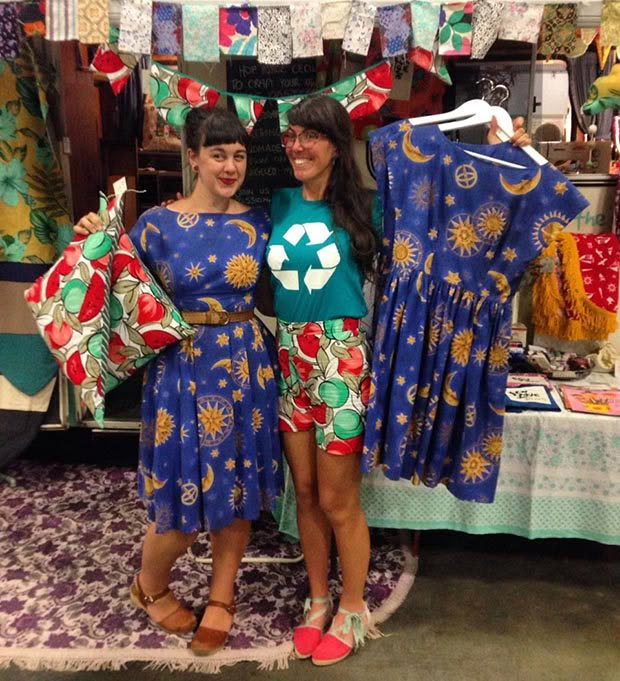
Many people regard sewing as a vintage occupation with peggy squares and tea cosies springing to mind. Something done in the spare room on a rainy Sunday – mostly solitary and perhaps cat-related. However, Sarah reckons there’s potential to make sewing a social thing.
“We’ve had so many fun Friday night ‘sewcials’. Perhaps I started Sew Love just to meet crafty friends to get creative with.”
And while the current ‘maker movement’ is seeing an increasing number of young people eager to acquire gardening and preserving skills, they’ve not cottoned on to sewing as a cool art in the same way – yet.
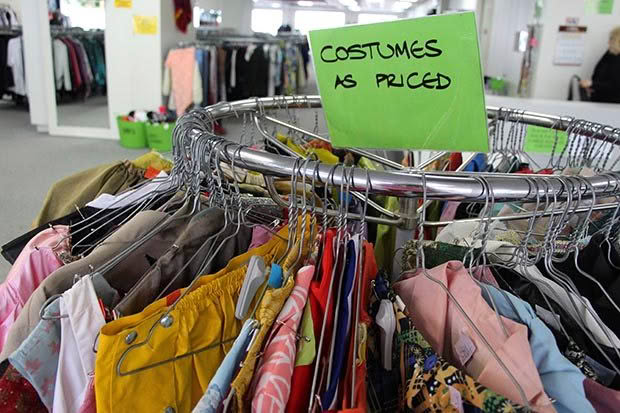
Sarah sources some of her interesting fabrics from op-shops
“On tour it was males who were more likely to jump on a machine and repair a hole in their favourite jeans. Too often I heard from the gals, ‘Oh I’m not domestic.’
When the arcade was redeveloped, Sew Love had to close its doors. However, Sarah wanted to keep the spirit of Sew Love alive – and spend the summer at the beach.
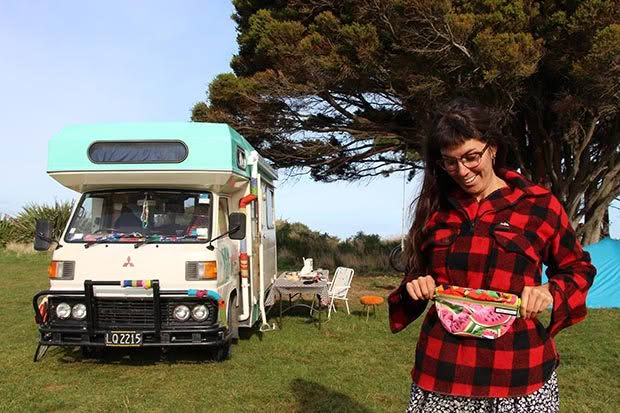
Sarah on tour with Cecil.
Enter Cecil the Pledgeme-Crowdfunded caravan The solar panel on Cecil’s roof runs four sewing machines, an overlocker, lights and music but can’t run an iron (he’s no straight-edger). Seamlessly stitching her way down the country, the big colourful truck started conversations and attracted all kinds of people.
Many of Cecil’s visitors had a story to share about sewing and knitting such as memories from Form 1 sewing class, or childhood lessons from their grandma.
“It was a far-fetched dream, to tour all of our beautiful country teaching sewing and sharing the love” says Sarah. When she found herself in Kaikoura, 10 metres from perfect surf surrounded by fellow travellers doing their mending, all on solar, it was a ‘pinch yourself’ moment. “This must be living the dream,’ she thought.
After two summers on tour, she settled in Raglan for permanent post-touring life. She now sews bumbags, surf ponchos and reusable bags which she sells at markets and online via etsy.com/nz
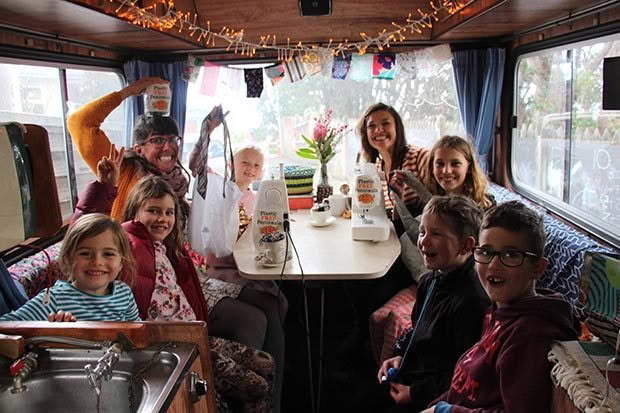
Junior sewers learning sewing skills inside Cecil.
Sew Love is more than just sewing classes, she says it’s about celebrating sustainable sewing, upcycling projects, op-shopping and sharing sewing resources to spread environmentally friendly ideas and empowerment through crafty DIY.
“We can all do a way-better job of protecting the environment and there are many fun ways to do it. Why buy new when, with a few skills, you can mend broken things? Why would you not take a reusable tote bag with you when you leave the house to go buy groceries?”
Taking part in Plastic Free July is a great first step to becoming more conscious of consumerism and plastic use.
“It’s about getting into the habit of saying, “I don’t need a plastic bag, thank you. No straw, please,” she says.
Now that she’s settled in Raglan, Sarah will be soon running classes again in spaces in Raglan and Hamilton. Cecil hopes to make some more appearances at markets around the North Island too.
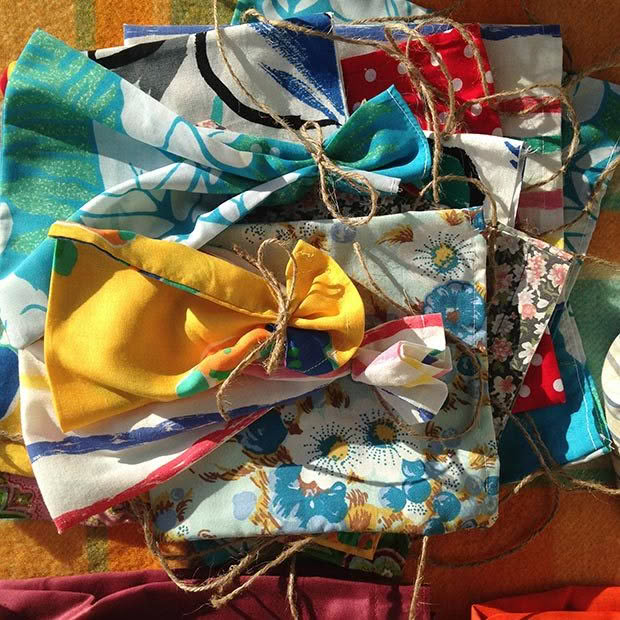
Fabric bags from Sew Love.
Follow Sew Love on on Instagram @sewlovenz and Facebook to get involved in the sustainable sewing movement.
MORE STORIES YOU MIGHT LIKE
Zero-waste blogger Amanda Chapman on the future of the community fridge
Reduce your plastic consumption and make your own natural cleaning products
Sustainable food producers thinking outside the box on Great Barrier Island

